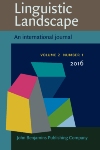
Linguistic Landscape-An International Journal
Scope & Guideline
Connecting Cultures through Linguistic Expressions
Introduction
Aims and Scopes
- Sociolinguistic Analysis of Public Space:
The journal emphasizes the sociolinguistic dimensions of linguistic landscapes, exploring how language use in public spaces reflects and shapes social identities, community dynamics, and cultural narratives. - Semiotic and Multimodal Approaches:
It adopts semiotic frameworks to analyze the visual and textual elements present in the linguistic landscape, investigating how these elements convey meaning and influence perceptions of place. - Political and Activist Dimensions:
The journal highlights the role of linguistic landscapes in political activism and social movements, examining how language in public spaces serves as a medium for protest and expression of dissent. - Translingualism and Multilingualism:
A consistent focus is placed on translingual practices and multilingualism in public signage, investigating how diverse linguistic resources are utilized to negotiate identities and community belonging. - Cultural and Historical Contexts:
The journal often situates linguistic landscapes within their cultural and historical contexts, analyzing how past events and cultural heritage shape contemporary language use in public spaces.
Trending and Emerging
- Impact of COVID-19 on Linguistic Landscapes:
The pandemic has spurred a significant increase in research examining how COVID-19 has transformed public signage and language use, reflecting changing social norms and community responses during health crises. - Gender and Sexuality in Linguistic Landscapes:
There is a growing focus on how gender and sexuality are represented and contested in public spaces, highlighting the intersection of linguistic landscapes with issues of identity and representation. - Environmental and Ecological Perspectives:
Emerging themes also include ecological considerations in linguistic landscapes, as researchers explore how language interacts with environmental issues and public space in the context of sustainability. - Transnational and Diasporic Studies:
An increase in research on transnational and diasporic communities is evident, reflecting the complexities of identity and language in increasingly globalized urban environments. - Digital and Online Linguistic Landscapes:
Scholars are increasingly investigating the role of digital signage and online representations of linguistic landscapes, acknowledging the importance of virtual spaces in shaping public discourse.
Declining or Waning
- Traditional Language Policy Studies:
Research specifically centered on traditional language policy frameworks seems to be less frequent, as scholars increasingly explore more nuanced interactions between language, power, and identity in public spaces. - Static Representations of Linguistic Landscapes:
There is a noticeable decline in studies that solely focus on static representations of linguistic landscapes without considering the dynamic and interactive aspects of language use in public contexts. - Narrow Geographic Focus:
Papers that concentrate exclusively on specific geographic locations without connecting to broader themes of globalization or translocality are becoming less common, reflecting a trend towards more globalized analyses.
Similar Journals
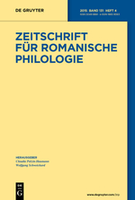
ZEITSCHRIFT FUR ROMANISCHE PHILOLOGIE
Exploring the Rich Tapestry of Romance Languages and LiteratureZEITSCHRIFT FUR ROMANISCHE PHILOLOGIE, published by Walter de Gruyter GmbH, stands as a prominent peer-reviewed journal dedicated to the fields of Linguistics, Literature, and Literary Theory. Established in 1877 and continuing its legacy to the present day, this esteemed journal offers a platform for comprehensive scholarship that explores the intricacies of Romance languages and their literary heritage. With a notable Q1 ranking in Literature and Literary Theory and a Q2 ranking in Linguistics and Language, it has secured its place among leading resources in the humanities. Researchers, educators, and students benefit from its rich historical context and current contributions to the understanding of Romance languages and literature. Though currently not available as Open Access, the journal prioritizes the dissemination of high-quality research, making significant strides in fostering academic dialogue and advancement. Its address at Genthiner Straße 13, Berlin, Germany, situates it in a hub of scholarly activity, bridging the past with contemporary literary discourse.

Language Dynamics and Change
Advancing Insights into Language DynamicsLanguage Dynamics and Change is a premier academic journal dedicated to exploring the evolution, variation, and transformation of languages over time. Published by BRILL, a reputable name in scholarly publishing, this journal aims to provide researchers, professionals, and students with a robust platform for disseminating cutting-edge findings in the field of linguistics. With an impressive Q1 quartile ranking in the Linguistics and Language category and a commendable ranking of #170 out of 1088 in the Arts and Humanities sector, it occupies a significant position in the academic landscape, showcasing innovative research that fosters a deeper understanding of language dynamics. Although it does not currently offer open access, the journal is committed to enhancing accessibility through various distribution channels. As we look ahead to its convergence period extending until 2024, Language Dynamics and Change continues to affirm its status as a vital resource for advancing the study of language evolution worldwide.
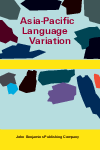
Asia-Pacific Language Variation
Charting New Territories in Linguistic Research and CollaborationAsia-Pacific Language Variation is a prominent scholarly journal published by John Benjamins Publishing Co, dedicated to the exploration and analysis of linguistic diversity across the Asia-Pacific region. With its ISSN 2215-1354 and E-ISSN 2215-1362, the journal serves as a key resource for researchers and practitioners in the fields of linguistics and language studies. Since its inception in 2019, it has quickly ascended in stature, receiving a 2023 category quartile ranking of Q2 in Linguistics and Language and achieving impressive Scopus rankings, placing it in the 83rd percentile in Arts and Humanities and 81st in Social Sciences. Through its rigorous peer-reviewed articles, the journal aims to foster a deeper understanding of language variation, promoting interdisciplinary research and collaboration. Although it is not an open-access journal, the depth of research and critical insights offered in its pages make it an invaluable asset for academics, students, and professionals keen on the nuances of language within the dynamic Asia-Pacific context.
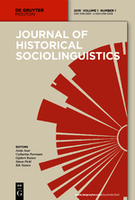
Journal of Historical Sociolinguistics
Unraveling the Threads of Language and SocietyThe Journal of Historical Sociolinguistics is a distinguished publication focusing on the intricate relationships between language and society from a historical perspective. Published by WALTER DE GRUYTER GMBH in Germany, this journal (ISSN: 2199-2894, E-ISSN: 2199-2908) is recognized for its rigorous scholarship, ranking in the Q2 quartile in Linguistics and Language (2023), highlighting its relevance and impact within the academic community. With Scopus rankings placing it at #326/1088 in Arts and Humanities and #386/1167 in Social Sciences, this journal is essential for researchers and scholars interested in the dynamics of language evolution, sociolinguistic shifts, and historical context. Through its insightful articles and contributions, the journal aims to illuminate the nuanced interplay between linguistic change and social factors over time, making it an invaluable resource for students, professionals, and academics alike. The journal operates under an open-access model, ensuring that knowledge is disseminated widely and freely accessible to those engaged in the cutting-edge studies of sociolinguistics.

Onomazein
Advancing Language Studies with Global ReachOnomazein is an esteemed academic journal published by the Pontificia Universidad Catolica de Chile, Facultad de Letras, featuring a dedicated focus on the field of Linguistics and Language. With an established presence since 2011, it reaches an international audience and is recognized for its contributions within the Q2 category of Linguistics as per the latest rankings, underscoring its significance in the academic community. The journal holds a commendable position in Scopus, ranking 470th out of 1088 in Arts and Humanities and 549th out of 1167 in Social Sciences, reflecting its relevance and impact in the domain. Although it does not currently offer an open access option, Onomazein remains a critical platform for researchers, professionals, and students seeking to advance their understanding of linguistic phenomena and engage with contemporary debates in language studies. For submissions and more information, please refer to the university’s address at AV Vicuna Mackenna 4860, Santiago, Chile.
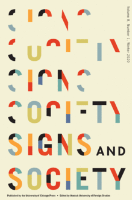
Signs and Society
Transforming Understanding of Communication PracticesSigns and Society is an acclaimed academic journal published by University of Chicago Press, specializing in the interdisciplinary exploration of semiotics, cultural representations, and communication practices. With an impressive ISSN of 2326-4489 and E-ISSN 2326-4497, this journal has established itself as a credible source of research and insight within its fields. It operates under a robust framework with a convergence of topics from 2015 to 2024, and has achieved notable rankings, including Q1 placements in Cultural Studies, Linguistics and Language, and Visual Arts and Performing Arts in 2023, elevating it to a leading status among its peers. The journal’s impact is reflected in its Scopus rankings, positioning it in high percentiles across diverse categories, making it a vital resource for scholars, practitioners, and students interested in the intricate relationships between signs, society, and culture. Although not an open access publication, Signs and Society remains essential for those seeking to deepen their understanding of communication dynamics and the multifaceted dimensions of cultural expression.

NEUPHILOLOGISCHE MITTEILUNGEN
Connecting Scholars through Language and TheoryNEUPHILOLOGISCHE MITTEILUNGEN, published by the esteemed Modern Language Society, stands as a significant contribution to the domain of Language and Linguistics. With a history dating back to 1971, this journal has consistently provided an academic platform for researchers and scholars, navigating through the intricacies of philology and linguistic studies. Although it is indexed in Scopus with rankings reflecting its position in the Arts and Humanities and Social Sciences categories, it currently does not offer Open Access, which may require interested parties to seek institutional access for its wealth of content. The journal has experienced periods of coverage discontinuation in recent years, yet it remains a valued source for advancing the understanding of language theories and linguistic practices. Its location in Helsinki, Finland, offers a unique European perspective on global linguistic issues. The journal is ideal for those looking to engage with evolving linguistic trends and contribute to contemporary discussions in the field.

Tomskii Zhurnal Lingvisticheskikh i Antropologicheskikh Issledovanii-Tomsk Journal of Linguistics and Anthropology
Advancing Interdisciplinary Insights in Linguistics and AnthropologyTomskii Zhurnal Lingvisticheskikh i Antropologicheskikh Issledovanii (Tomsk Journal of Linguistics and Anthropology), published by TOMSK STATE PEDAGOGICAL UNIVERSITY, is a prominent open-access journal dedicated to advancing the fields of linguistics and anthropology. With a keen focus on interdisciplinary research, this journal provides a platform for scholars, researchers, and students to publish cutting-edge studies that explore the intricate ties between language and culture. Although specific impact factors and rankings are currently unavailable, the journal's commitment to fostering dialogue and innovation in the social sciences positions it as an essential resource for professionals seeking to broaden their understanding of human communication and social behaviors. Encompassing a wide array of topics from sociolinguistics to ethnographic studies, the Tomskii Zhurnal invites contributions that challenge conventional paradigms and contribute to the richness of linguistic and anthropological scholarship.

Turkic Languages
Navigating the Intricacies of Turkic Language StudiesTurkic Languages is an esteemed academic journal published by HARRASSOWITZ VERLAG, dedicated to the exploration and analysis of Turkic languages within the broader fields of linguistics and language studies. With an ISSN of 1431-4983, this journal serves as a vital platform for researchers, professionals, and students interested in the intricate structures, dynamics, and cultural contexts of Turkic languages. Although it currently operates without an Open Access option, the journal's commitment to quality research is evident in its placement within the Q4 category of Linguistics and Language for 2023, alongside its Scopus rankings where it stands in the 30th and 26th percentiles for Language and Linguistics across Arts and Humanities and Social Sciences, respectively. The journal's scope encompasses a variety of linguistic phenomena, striving to foster a deeper understanding of Turkic languages and their significance in the global linguistic landscape. With converged years from 2017 to 2022, Turkic Languages continues to uphold its reputation as a crucial resource for advancing scholarship in this specialized field.

Linguas e Instrumentos Linguisticos
Advancing Linguistic Research Through Innovative InsightsLinguas e Instrumentos Linguisticos is a premier academic journal dedicated to the exploration and analysis of language and linguistic tools, published by RG EDITORA in collaboration with Universidade Estadual de Campinas (UNICAMP). With a focus on enhancing the understanding of linguistic structures and applications, this journal serves as a vital resource for researchers, professionals, and students interested in the dynamics of language within various contexts. Although currently not open access, it offers a wide array of scholarly articles that delve into innovative methodologies, theoretical frameworks, and empirical studies in linguistics. Operating out of São Paulo, Brazil, Linguas e Instrumentos Linguisticos fosters a rich academic dialogue and is committed to advancing the field of linguistic research, making it an essential read for anyone engaged in linguistic studies.